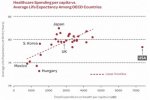- Joined
- Jul 13, 2012
- Messages
- 47,695
- Reaction score
- 10,467
- Gender
- Male
- Political Leaning
- Other
your approach would be just as 'useful' when evaluating the services of a gerontologist
assuming if any patients died, it was only because of the inadequacy of the physician
What I'm suggesting is the kind of quality improvement review that goes on in any organization that is seeking to improve the outcome of its efforts.
Based on historical statistics, construct a process that seems best to achieve a better result. Always assume that improvement is possible.
Follow the process.
Check the result(s) and determine which part(s) of the process need to be improved and how.
Implement the improvements and start again.
Continuously improve the processes.
I'm fairly certain that the medical industry uses various forms of process control. I'm fairly certain that fatality rates are one of the metrics they measure.
In all quality improvement processes, the key to any improvement is this: If it can't be measured, it can't be managed.
Make all decisions based on data. The customer defines quality. We are all on one team. That last point is lacking in many for profit efforts.
These are the three corners of a pyramid that will produce quality results. In the three points above, the term "customer" refers to anyone who is the next person in line. If my job is assembling statistics to be reviewed and never reaches a purchaser of anything, my "Customer" is the person or team that reviews those statistics. If my efforts are producing an unintelligible jumble of numbers, it is the job of my customer to tell me that and let me know what they would like to see to make this more understandable.
In the case of education, the educator needs to receive an understandable statement of the quality of the students' understanding of the course material. If that understanding is lacking, then the process to deliver understanding must be modified to improve the understanding.


